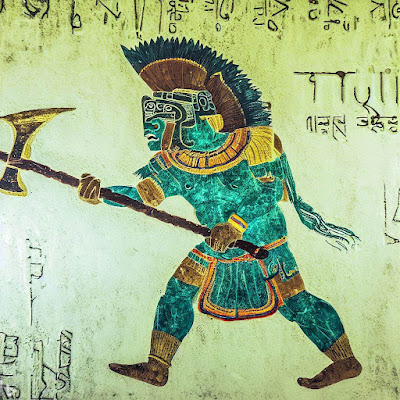 This is a quick and simple RPG system that lets players focus on imagination and roleplaying without getting distracted by constant dice rolls. Dice are only used when the referee decides a roll would add drama to a situation. It is possible to play the game without ever rolling a die.
This is a quick and simple RPG system that lets players focus on imagination and roleplaying without getting distracted by constant dice rolls. Dice are only used when the referee decides a roll would add drama to a situation. It is possible to play the game without ever rolling a die.Attributes
Each character is rated in Strength, Health, Speed and Intellect. Scores in these attributes range from 1 to 10. An average man has a score of 5 in all attributes. The referee assigns attribute scores in consultation with the players, or they can be generated randomly (roll 2d10 and halve the total).
Skills
Skills take precedence over attributes. Thus a character who is trying to dodge a falling rock, for instance, uses ACROBATICS rather than Speed. Only consult attributes when a feat is attempted that does not fall under any of the ten skills, or when two characters of equal skill-level are competing. The ten skills are:
- ACROBATICS
- COMBAT
- MARKSMANSHIP
- SEAMANSHIP
- SORCERY
- STEALTH
- SURVIVAL
- THIEVERY
- TRACKING
Normally the referee will simply pre-assign a level of difficulty to any task, and only characters at that level of ability have any chance of success. For example: the player characters are searching for someone lost in the slums. The referee decides this calls for TRACKING to at least Master level.
Use of dice is optional, but may be preferred in life-or-death circumstances —a daring leap from an upper window, etc. Dice can be used to see if a character utilizes their skill (or attribute) effectively. The player rolls 2d6. The roll needed for success depends on the skill-level: Basic 2-4, Advanced 2-6, Master 2-8 and Grandmaster 2-10.
Melee procedure
First compare the COMBAT skill-levels of the two fighters; the higher wins.
If they both have the same skill-level, compare attribute scores—Speed in case of weapons, Strength if a fistfight. If both have the same attribute score, compare the weapons being used (a sword is better than a dagger, dagger better than a cudgel, etc).
For circumstances involving more than one combatant, Assume that each skill-level is twice as good as the one below it. (Thus a Grandmaster warrior would be exactly a match for eight Basic warriors, other factors being equal.)
Wounds
Both combatants lose a set amount of Health depending on the opponent’s weapon: fists 1, cudgel 2, dagger 3, sword 4, two handed sword 5.
The winner of the melee has the option to increase the loser’s injury by 1 point for each skill-level that their COMBAT exceeds the loser’s. Alternatively, if they have a shield, they can reduce their own injury.
Shine Points (if any) can then be spent to reduce damage.
Lastly, armour reduces the injury: 1 point for light, 2 points for medium, 3 points for heavy.
Missiles
At Basic Level, MARKSMANSHIP allows you to automatically hit a stationary target in good light at short range. Each higher level allows you to cope with one more negative factor from this list:
- poor light
- small target
- moving target
- long range
- undergrowth
Moments of excellence
Shine Points are awarded by the referee when a character achieves fulfilment of a vow, has great success in an adventure, does something clever, receives a blessing or magical boon, gains the respect of others, etc. Shine Points represent the character gaining the confidence to occasionally surpass their normal limits.
Shine Points are spent to achieve tasks that would not normally be possible for the character, such as hitting a target at long range if you’re only a Basic Level in MARKSMANSHIP. Hitting that same target at long range in poor light in heavy undergrowth would cost 3 Shine Points. As mentioned above, you can also use Shine Points for other things like shrugging off damage. Once you’ve spent the Shine Points, they’re gone for good – until you earn some more.
Magic
SORCERY in this system generally takes longer to use than in most roleplaying games, but with effects more like you would expect in fantasy literature. For instance, a Grandmaster could teleport himself from city to city. Being opposed by the will of another sorcerer makes a spell more difficult.
Basic level effects include (eg) silent mirages that disappear when touched. Higher skill-levels then allow improvements up to full solid illusions at Master. The number of spells a sorcerer can maintain is one at Basic, two at Advanced, etc. Note that SORCERY can always be used to achieve an effect equivalent to another skill two levels lower. For instance, a Master can employ magic that achieves the effect of Basic TRACKING, MARKSMANSHIP, etc.
If you're familiar with the Critical IF gamebooks (originally published as Virtual Reality Adventures) or even with Knightmare book five: The Forbidden Gate you'll recognize the genesis of these rules there. I originally published them as Kashtlanmüyal in my and Steve Foster's Tekumel fanzine The Eye of All-Seeing Wonder - the spring 1995 issue to be exact. (The title? It's a Tsolyani word that means "epic dramas", or if freely translated could be "blockbusters".) I'd been serializing Tirikelu in the fanzine back then, and this was at the opposite pole of complexity. Or so I thought, for I had yet to encounter GURPS!










